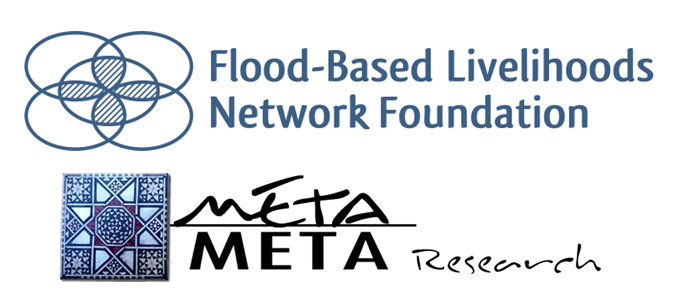Dear all,
Hope things are fine with you!
We are happy to have a couple of things to share with you – all turning floods into assets, as is our motto….
Facebook Page of Spate Irrigation Network!
To get more attention for flood based farming systems the Spate Irrigation Network Foundation is available on Facebook! Click here to check the account. Like the account to spread it more and more…
Tree Management in FBFS: Grafting of Jujube Trees
Annual vegetable and field crops are normally propagated by seeds, but most perennial fruit species are grafted to maintain characteristics identical to the mother plants and reduce the time it takes to fruit. This video prepared by the Research and Development Foundation Pakistan explains the grafting of the Jubube Tree (Ziziphus jujuba Mill.). Jujube (also red date or ‘ber’) is a very important crop in flood based areas – for one the Ziziphus honey is the world’s most precious and costly honey!
Video: Grafting of Jujube tree
More Tree Management: Cultivating and pruning Baobab and Moringa Oleifera for multiple uses
More tree management in flood based farming systems! The Baobab and Moringa Oleifera are known as trees that are used for multiple uses such as food, beverages and medicine as well as providing fibre for ropes and mats. In order to diversify food sources with high nutritional value, the Millennium Challenge Mali-Agency (MCA-Mali) and the World Agroforestry Centre (ICRAF), through its regional office for Central Africa and West Sahel in collaboration with the Institute of Rural Economy (IER) documented how to cultivate/prune the Baobab and Moringa Oleifera in gardens as a nutrition bank.
Document: Les planches legumiers de banque alimentaire
Farmer-managed revegetation
The natural vegetation of Gash Die in Sudan is degrading due to charcoal production and the invasive Prosopis Juliflora (mesquite) taking over the ecosystem, sometimes drying up other plants. There used to be a much larger variety of trees – with hardy species such as Acacia, Belanitus, Zizyphus and Tamarix. This land degradation is also common in other drylands of the world.
However, there are adaptation measures that can be taken to reverse degradation. One of them is farmer-managed natural regeneration (FMNR), a very simple practice whereby existing vegetation on degraded land is identified, managed and protected. Woody species can regenerate naturally in those areas where topsoil contains stocks of seeds or where there are underground root systems.
In Niger, where FMNR became a common practice, it had an incredible impact, 3 million hectares across Niger’s agricultural zone have been re-vegetated, and can offer valuable insights and lessons to learn from.
Growing fodder grasses, using flood water
The production of fodder is a priority in most spate-irrigated areas in order to support livestock. There is large scope to use floods for the relatively low skill cultivation of fodder grasses. It is a major business in Somaliland for instance. In the videos below, Professor Nashon Musimba (South Eastern Kenya University) explains the potential of indigenous fodder grasses Eragrostissuperba Grass (common name-Masailovegrass) and Cenchrusciliaris (commonly called African fox-tail grass or buffelgrass), based on research in Kenya.
Videos:
Some fodder grasses indigenous to Kenya
The potential of indigenous fodder grasses
Cooperation with Universities – putting flood based farming in regular education system – seeking cooperation
Even in areas where most of the farming is flood based, university teaching is not reflecting this. Instead, it is common to have university teaching concentrating solely on conventional irrigation systems. To change this the Spate Irrigation Network Foundation is working with Universities in Pakistan (Arid Zone University Rawalpindi, Gomal University and the University of Agriculture Faisalabad), Ethiopia (Mekelle University), Sudan (Kassala University) and Yemen (Water and Environment Centre) to integrate flood based farming into the BSc or MSc curricula. We are now looking for more universities to work with! Please provide us with suggestions and contacts for universities that are interested and keen– sending an email toameharihaile@metameta.nl.
Closely related: Using Roads for Water
We also want to draw your attention to the initiative to make systematic use of roads for water harvesting. Global investment in roads is close to 2 Trillion and in many instances roads act as embankments or drains, significantly changing the surface hydrology. However, generally, roads are designed without paying attention to their potential for harvesting floodwater and instead the opposite happens – with roads being a major cause of erosion, sedimentation and uncontrolled flooding. The Roads for Water Initiative (www.roadsforwater.org) wants to turn this around and introduce good roads for water practice in a large number of countries. Remember that run-off from roads often comes as floods – so there is much similarity. For ideas on taking this further, please contact Marta Agujetas – marta@metameta.nl.
Farmer learning material
The Spate Irrigation Network Foundation want to gradually transform into a network of farmers and have its membership rooted more and more on water users associations in the flood based areas. For this reason, farmer to farmer learning events are being organized, such as the event taking place in Alamata in Tigray, Ethiopia in which sixteen model farmers and six pastoralists from three regions in Ethiopia namely: Tigray, Southern People Nations and Nationalities (SNNP) and Afar were gathered and shared their valuable experiences on water management, agronomic practices, crop protection, water sharing, institutional arrangements including how water user associations could be strengthened. We have also created a repository of farmers learning materials – you can find it at the Farmer learning materials page.
At the African Water Week
The spate irrigation network will be part of a technical session at the African Water Week under the CGIAR /WLE program including the Harnessing Floods to Enhance Livelihoods and Ecosystem Services project. The technical session is called: Sustainable Intensification: Finding solutions to improved Water, Land and Ecosystem management in the Nile Basin and East Africa
When: Wednesday, July 20, 2016
Time: 12:30 – 13:30 hrs
For more information see https://wle.cgiar.org/event/africa-water-week.
Wishing you the best,
Abraham, Frank, Finhas, Matthijs and Linda
